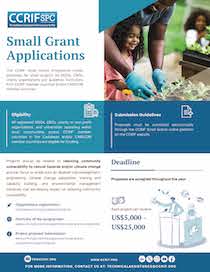Bridgetown, Barbados, February 23, 2017 – CCRIF SPC (formerly the Caribbean Catastrophe Risk Insurance Facility) launched its 10th anniversary celebrations at the Caribbean Development Bank (CDB) on February 20th under the theme “celebrating 10 years of innovation in catastrophe insurance… in the Caribbean and Central America”.
This launch is the beginning of a year of activities that will focus on CCRIF and its milestones over the past 10 years and more importantly enable stakeholders to strategically engage with CCRIF to chart its strategic direction to 2030 to better serve Caribbean and Central American countries and to play its part in advancing Agenda 2030 – the global goals for sustainable development – and effectively contribute to the global vision of leaving “no one behind” in development.
Persons at the launch included, among others, the Prime Minister of Saint Lucia, Hon. Allen Chastanet; Senator the Hon. Darcy Boyce, Minister in the Barbados Office of the Prime Minister; Hon. Fayval Williams, Minister of State in Jamaica’s Ministry of Finance and the Public Service; Mr. Joseph Cox, CARICOM Assistant Secretary-General for Trade and Economic Integration; Ms. Ana Campos, Senior Disaster Risk Management Specialist at the World Bank; Dr. Warren Smith, President of the Caribbean Development Bank; Ms. Elizabeth Riley, Deputy Executive Director of the Caribbean Disaster and Emergency Management Agency; and Mr. Milo Pearson and Mr. Isaac Anthony, CCRIF Chairman and CEO, respectively.
On behalf of CARICOM, Mr. Joseph Cox saluted CCRIF as the world’s first regional parametric risk insurance pool, and another CARICOM best practice that is being shared with the world. He noted that CCRIF is evidence that small countries, together with their development partners – multilateral financial institutions and bilateral partners – can work together to address their vulnerabilities and build resilience.
CCRIF was formed in 2007 when CARICOM requested assistance from the World Bank to design and implement a cost-effective risk transfer programme for member governments, following the devastation caused in the region by Hurricane Ivan in 2014, and was the result of technical and financial support from the World Bank, CDB, the European Union and the governments of Japan, Canada, UK, France, Ireland and Bermuda.
Hon. Fayval Williams reflected on Jamaica’s involvement with CCRIF, noting that this involvement began even before CCRIF was formed. CCRIF’s project design, whilst led by the World Bank, was also conducted in collaboration with Jamaica through the Jamaica Social Investment Fund (JSIF) as well as the Organisation of Eastern Caribbean States (OECS) Secretariat. The design of CCRIF was particularly challenging, as CCRIF was the first multi-country, multi-peril pooled catastrophe risk insurance facility in the world.
The importance of CCRIF as a policy vehicle was highlighted by CDB President Dr. Warren Smith, who stated that, in his opinion, “CCRIF’s most significant role in its initial years was to enable finance, disaster and meteorology professionals to work together and to align the disaster risk management and fiscal policy frameworks of their countries.”
Ms. Ana Campos stressed that the World Bank’s presence at the launch of CCRIF’s 10th anniversary celebrations was an important testimony of the joint efforts to support the fiscal resilience of the Caribbean and Central American countries to catastrophes caused by natural events. She reiterated the World Bank’s continued support: “As we commemorate the great advances of this first decade, we have to prepare for the years to come. Catastrophe risk pools are now considered not only a financial vehicle but also a policy vehicle. They have to become a vital instrument within comprehensive disaster risk management and climate change strategies.”
Since its inception, CCRIF has made 22 payouts to 10 member governments totalling US$69 million, including its highest payout to Haiti after Hurricane Matthew last year. All payments were made within 14 days of the event. CCRIF Chairman Mr. Milo Pearson noted that “We have witnessed first-hand how payouts have resulted in reduced burdens on state finances and many of the payouts were used almost immediately to assist with post-disaster clean-up, assistance to communities, clearing roads and rehabilitating important infrastructure.” Countries have used payouts also for longer-term initiatives such as capitalizing special recovery funds and improving weather systems to better enhance early warning mechanisms.
Saint Lucia Prime Minister Hon. Allen Chastanet, in the keynote address titled “Importance of Parametric Insurance and the CCRIF Model to Economic Growth and Fiscal Sustainability”, remarked that CCRIF “is critical, given that Caribbean countries now have to deal with the increasing occurrence of natural disasters in addition to grappling with tight budgets.”
Prime Minister Chastanet cited CCRIF’s quick payouts as a critical benefit for its members – payouts which are made within 14 days after an event. He noted that often, assistance from donor organizations is provided only after many months and may be in the form of loans, thus increasing countries’ debt burden. He appreciated that, with CCRIF, governments are informed very soon after the event if they will receive a payout and the expected value of the payout and that these funds can be made available at the time when it is most needed – right after a disaster – allowing governments to have immediate liquidity to assist persons most in need, repair critical infrastructure and bring important social services back into operation in the quickest possible time.
CCRIF CEO, Mr. Isaac Anthony stressed that “Our many successes were accomplished only because we worked in close partnership with member governments as well as a variety of national, regional and international organizations and other key stakeholders” and reiterated that CCRIF looks forward to working with all its stakeholders in the Caribbean and Central America in this 10th anniversary year to chart the way forward to 2030.
He informed participants that CCRIF will continue to respond to members’ needs and in respect of this, the facility is currently developing three new products – for drought, agriculture and the fisheries sector – two of which are expected to be launched as part of the 10th anniversary celebrations.
| At the launch of CCRIF’s 10th Anniversary celebrations on February 20, 2017 at the CDB, Barbados L-R: Dr. Warren Smith, President, Caribbean Development Bank; Senator the Hon. Darcy Boyce, Minister in the Barbados Office of the Prime Minister; Hon. Allen Chastanet, Prime Minister of Saint Lucia; Mr. Milo Pearson, Chairman, CCRIF SPC and Mr. Isaac Anthony, CEO, CCRIF SPC |
Mr. Joseph Cox, Assistant Secretary-General for Trade and Economic Integration at the CARICOM Secretariat, making remarks at the launch of CCRIF’s 10th Anniversary celebrations on February 20, 2017 at the CDB, Barbados |
| Hon. Allen Chastanet, Prime Minister of Saint Lucia, making a point in his keynote address at the launch of CCRIF’s 10th Anniversary celebrations on February 20, 2017 at the CDB, Barbados | (L-R) Hon. Fayval Williams, Minister of State in Jamaica’s Ministry of Finance and the Public Service; Dr. Warren Smith, President of the Caribbean Development Bank; and Ms. Ana Campos, Senior Disaster Risk Management Specialist at the World Bank at the launch of CCRIF’s 10th Anniversary celebrations on February 20, 2017 at the CDB, Barbados |
| Mr. Francis McBarnette, Resident Representative Barbados, Organization for American States (OAS) (L) and Mr. Devon Rowe, Director, Caribbean Centre for Development Administration (CARICAD) at the launch of CCRIF’s 10th Anniversary celebrations on February 20, 2017 at the CDB, Barbados |
About CCRIF SPC: CCRIF SPC is a segregated portfolio company, owned, operated and registered in the Caribbean. It limits the financial impact of catastrophic hurricanes, earthquakes and excess rainfall events to Caribbean and – since 2015 – Central American governments by quickly providing short-term liquidity when a parametric insurance policy is triggered. It is the world’s first regional fund utilising parametric insurance, giving member governments the unique opportunity to purchase earthquake, hurricane and excess rainfall catastrophe coverage with lowest-possible pricing. CCRIF was developed under the technical leadership of the World Bank and with a grant from the Government of Japan. It was capitalized through contributions to a Multi-Donor Trust Fund (MDTF) by the Government of Canada, the European Union, the World Bank, the governments of the UK and France, the Caribbean Development Bank and the governments of Ireland and Bermuda, as well as through membership fees paid by participating governments. The Central America SP is capitalized by contributions to a special MDTF by the World Bank, European Commission and the governments of Canada and the United States.





